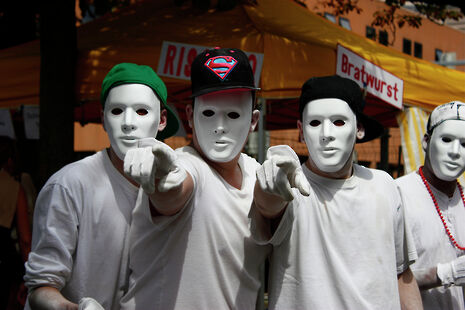Are we losing sight of who we are?
Don’t communicate via a façade, but as your true self

In many respects, gender inequality and insecurity about sexuality can be traced largely back to our society’s “prescribed identity fetish”. We are so bombarded by ideals that we lose sight of our own individual selves, and become preoccupied with fulfilling a series of expectations: being feminine, masculine, straight, gay and so on.
These ideals are presented as the most desirable way to be by celebrity culture, mainstream media and advertising, although they are, by definition, unattainable. This combination of the impossible and the desirable allows for it to become all consuming, until people are so insecure, constantly checking themselves against society, that they lose sight of their own desires and their own relationships.
Looking at different manifestations of these social expectations illuminates the power of prescriptive identity. ‘Wolf whistling’, for instance, is a bizarre phenomenon, as it expresses a person’s sexual lust while in no way bringing them closer to acting on it. It is usually (though not always) performed by a male in a group as a means to show off his ‘masculinity’. Masculinity is a social construct, and the form of ‘laddishness’ represented by vocal sexual expression appeals to this masculine ideal.
I reject the idea that this highlights how males are inherently female-intimidating sexual predators, as they rarely achieve sexual success from their mating call. It is a purely social construct, appealing to a particular identity to which some males feel they must conform. This sort of masculine ideal oppresses women, while also contributing to a patriarchal social structure in which both men and women are insecure, constantly attempting to meet ideals.
When a female wears clothing which is ‘slimming’ or designed to ‘cover up the curves’, or wears particularly revealing clothes, or a layer of expensive face paint to hide their natural skin, it appeals to our social ideal of femininity. Our society bombards young girls with skinny models, or celebrities with implants, talking about how their clothes and makeup contribute to the perfection of their body form. This ignores the fact that females are largely born how they are, and should be comfortable in their body, so long as they are of a healthy size.
Showing your body in a way which is explicitly sexually provocative is treated as a goal, even though it invariably appeals to a ‘lad’s’ masculine sexual ideal. Is that empowering for a woman: that she has a sexual authority over men? Or does it just define women by exactly what the social ideals want?
What is more perverse is that these clothes are often physically uncomfortable, with makeup potentially irritating skin, and excessive hair styling damaging the hair itself. You are forced to sacrifice physical comfort for comfort in a social context.
The convenient upshot of this complex web of insecurities is that people feel the necessity to become nothing more than a consumer. The tools to aspire to ‘perfection’ are expensive: clothing, makeup, fast cars, surgery; things that change how you look but not who you are.
People are divided up and compartmentalised into different identity groups, which focus on the spectacle and not on the individuals. Countless arbitrary prescriptive labels have the social effect of stopping people looking at the broader issue.
It contributes to political apathy and allows for us to be entirely distracted from the realities of inequality. It disarms us from feeling we have any power, as all that we are “good for” is fulfilling our little place in the broader society.
The real question is: who benefits from this insecurity? Largely the people who pedal the labels. The clothing industry advertises on impossibly thin mannequins or impossibly perfect models. They even define what social ‘perfection’ is through their advertising. They present different ways to identify as a particular identity. Behind their pseudo-individuality mottos and taglines, there is an underlying sense of gendering and labelling.
Political parties push the message “be proud to be British”, but that is just another way to get people to blindly stand behind a political system with some kind of collective psychology. It is justified by mythologies of the past and ideas of national identity which just serve to distract from the problems of the present. It is another label benefiting those in power.
The insecurities, alienation and general apathy that prescriptive identities bring to modern society clearly only benefit those at the top. People are systematically distracted from what is important and kept in a perpetual state of misdirected aspiration. It enables big businesses to get bigger, and governments to stay in power while the population has no choice but to ignore what is going on.
In this situation, the question of what the individual can do is the hardest to answer. To notice that your individual self has its own distinct identity, and that the labels imposed on you are potentially there to control you, undermines this system fundamentally.
If you define yourself by yourself then your place in society becomes your own: you are not communicating via a façade, you are communicating as yourself. You aren’t preoccupied with looking one certain way, earning a certain amount of money, nor being a certain person. By giving humans greater individuality, society develops into one concerned with people, not types.
 News / Clare Hall spent over £500k opposing busway 24 December 2025
News / Clare Hall spent over £500k opposing busway 24 December 2025 Comment / The ‘class’ of Cambridge24 December 2025
Comment / The ‘class’ of Cambridge24 December 2025 News / Eight Cambridge researchers awarded €17m in ERC research grants27 December 2025
News / Eight Cambridge researchers awarded €17m in ERC research grants27 December 2025 News / Caius mourns its tree-mendous loss23 December 2025
News / Caius mourns its tree-mendous loss23 December 2025 Comment / League tables do more harm than good26 December 2025
Comment / League tables do more harm than good26 December 2025








